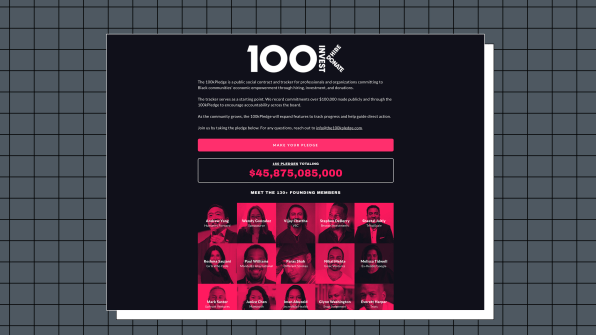Over the summer, as police shootings and protests put a new spotlight on racial injustice, corporation after corporation announced that they would donate money in ways meant to solve racial inequalities. Walmart pledged $100 million to create a new center on racial equity; ClifBar announced a donation of $100,000 to Color Of Change and the African People’s Education and Defense Fund; Gap said it would make a $300,000 donation to the NAACP and EmbraceRace.
To Vijay Chattha, founder and CEO of communications firm VSC, and some of his contemporaries, there were a few issues with this wave of philanthropy. How helpful were these donations, they wondered, in terms of actually enacting change and creating economic opportunity for Black Americans? And how could we trust that these companies would follow through on their bold promises?
To solve for those concerns, Chattha, along with Paras Shah, co-founder of marketing agency Different Strokes Creative, and Nihal Mehta, founding general partner at venture capital firm Eniac Ventures, launched the 100k Pledge, a platform to both inspire more people to commit to helping the Black communities’ economic empowerment, and a way to track such commitments from both individuals and corporations. “It’s a two pillar approach,” Chattha says. “One is to get more professionals to commit to something, even if it’s relatively small, and [two is] to track bigger organizations, so we can hold them accountable.”

Chattha started by asking what would actually move the needle in terms of Black economic empowerment. “The more and more I talked to people, the more and more it came down to small actions, like baby steps of social justice—creating a job for someone, creating a fellowship . . . donations were further down the list,” he says. “I thought that was fascinating because what I was seeing on the internet was mostly big companies or billionaires doing huge pledges, and you weren’t seeing anything in the middle. It didn’t feel like there was a lot of grassroots stuff happening with professionals.”
The 100K Pledge was a way to get more people, besides only CEOs and billionaires, on board with creating change. The 100K Pledge website lets people commit to dedicating at least $100,000 to Black economic empowerment over 10 years, either by creating hiring opportunities for Black talent, investing in Black owned businesses and venture funds, or by directly donating to scholarships, organizations working on advancing economic opportunity, and Black-owned businesses and entrepreneurs.
“I call it ‘social justice for the LinkedIn demographic,’” Chattha says. “It’s this group of people that are professionals that want to make change and are not necessarily always feeling like part of the change happening at the corporate level.” If a national company says it’s going to donate $1 billion, for example, what does that mean for the employees, or for change at the individual level within a company?
But the second purpose of the 100K Pledge is tracking those larger commitments, whether from Walmart and Gap or from the individuals who just signed on. The 100k Pledge website will serve as a public record of all those commitments, so they can’t be deleted off Twitter or buried under the latest press releases. The founders will reach out to every person and corporation annually to check in on their pledge and provide public updates.
By having a website of all these promises, Chattha hopes it also serves to keep public pressure on these commitments, even if news coverage of police brutality or other inequalities fades. Already, the site is tracking 160 pledges that total more than $45 billion.
The 100K Pledge platform is still new, and Chattha does expect some changes as it grows. They may utilize investigative reporters or volunteers to help track these commitments, for example. Another update to come in the near future, he says, is that the form to sign on to the pledge will allow people to explain in more detail what commitments they’re making; right now, the form just lets you check boxes for “hire,” “donate,” and “invest.”
With space to give more details, he hopes people can be inspired by solutions they may never have thought of themselves, like creating a new scholarship or doing something outside the scope of their workplace. “It’s about empowering more professionals to not rely on their company or their board to impact change,” Chattha says. When a company makes a promise, management might change or someone might get a new job, and that doesn’t help them make an individual difference. “There needs to be some way for individuals to do important things with the power they have as professionals, rather than always tied to the corporation.”
(28)